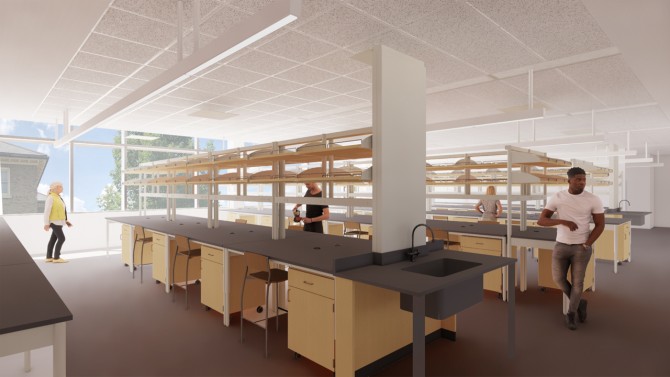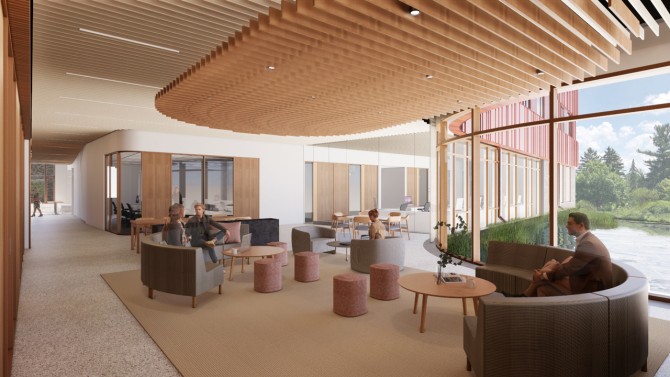A $30 million commitment from David R. Atkinson '60 and Patricia Atkinson will name a new multidisciplinary building on campus, intended to foster innovative and collaborative research in priority areas of sustainability, public health, cancer biology, immunology and computational biology.
Atkinson Hall, to be built on Tower Road adjacent to Rice and Bruckner halls, will be a four-story building (approximately 90,000 gross square feet) and include space for faculty and staff of the Cornell Atkinson Center for Sustainability and the new Master of Public Health program. It will also house laboratory and office space for faculty and staff of Cornell's new Center for Immunology and new Friedman Center for Nutrition and Inflammation, planned Center for Cancer Biology, and the Department of Computational Biology.
The new building will feature wet and dry labs for research in cancer biology and immunology.
Each of these programs is universitywide in scope and critical to research across the Ithaca campus, extending to Weill Cornell Medicine and Cornell Tech.
The Atkinsons are among Cornell's most generous benefactors, having provided a naming gift of $80 million in 2010 to establish Cornell Atkinson. The Atkinsons' other gifts for the center have supported its competitive grants programs, postdoctoral fellowships, endowed directorship and partnerships with external organizations such as the Environmental Defense Fund and The Nature Conservancy.
"Dave and Pat Atkinson are remarkable in their vision, and in their deep commitment to investing in the future - here on campus, and across so many areas of research that are critical to society," President Martha E. Pollack said. "From their initial commitment to seed interdisciplinary sustainability research, to their historic naming gift for the Cornell Atkinson Center for Sustainability, they have consistently sought the most effective ways to advance our research enterprise, enhance our ability to collaborate across disciplines, and ultimately strengthen our ability to create new knowledge that will have an impact for generations.
"With this new investment to fund Atkinson Hall," Pollack said, "Dave and Pat will dramatically increase Cornell's capacity to delve deeply and creatively into issues of climate change, energy, and health, and enable more resilient systems and societies."
The Atkinsons have also given generously to the College of Agriculture and Life Sciences (CALS), where they endowed the David R. Atkinson Professorship of Ecology and Environmental Biology, and to other areas throughout the university.
"This landmark gift from the Atkinsons is a testament to their long-term dedication to Cornell and to the fundamental importance of each of the multidisciplinary areas of research the new building will facilitate," said Robert S. Harrison '76, chairman of the Cornell Board of Trustees.
"While Atkinson Hall will be an inspiring physical home for researchers across the university," Harrison said, "its reach will immediately transcend its own walls and our Ithaca campus by building ever more productive collaborations with our colleagues at Weill Cornell Medicine and Cornell Tech in New York City."
The new building has been designed specifically to support each individual program while enabling interaction and collaboration among them - as well as with colleagues from across Cornell's campuses and around the globe. Its wide range of space types and sizes include gathering and group work areas; a mix of both closed and open wet lab environments; and a variety of meeting spaces to accommodate groups of varying size and technology-enabled virtual interactions.
A rendering of the first-floor collaborative space in Atkinson Hall, designed to foster interdisciplinary research.
The meeting and event spaces will all be located around an open staircase, creating a "collaboration core" accessible to building occupants around the clock.
In keeping with the Atkinsons' and Cornell's own strong commitment to sustainability, the new building will be LEED Gold-certified and net-zero-carbon ready. It will reduce energy demand by using an innovative building envelope; minimize the need for future renovations through built-in flexibility; use natural light strategically to reduce electricity usage; and manage storm water via an exterior rain garden.
"This building will serve as a hub for ambitious, smart people with amazing expertise in many disciplines to come together and by sharing their creativity and knowledge move us along a path to a better future," David Atkinson said.
Atkinson Hall will be situated on the north side of Tower Road, to the east of Rice Hall and across from the Kane Sports Complex, overlooking Cornell Botanic Gardens. Designed by the award-winning Lake Flato Architects of San Antonio, Texas - just named the nation's top architecture firm by Architect magazine - the new building will be clad in copper, with large windows and curving exterior and interior walls.
The building's central location will tie together the science and engineering corridor along Tower Road - from the College of Veterinary Medicine, CALS and the College of Human Ecology to the Cornell Ann S. Bowers College of Computing and Information Science, the College of Engineering and the College of Arts and Sciences.
"This new building represents a unique approach for Cornell," Provost Michael Kotlikoff said. "Atkinson Hall won't be 'owned' by any one college, but rather include centers, programs and departments that expand to and strengthen colleges and academic entities throughout the university.
"It will lift all boats," he said, "connecting our research community in a fundamentally empowering way and serving as a lynchpin to Cornell Tech and Weill Cornell Medicine."
In addition to providing working labs and convening areas, Atkinson Hall is expected to bring hundreds of researchers working across boundaries to the Ithaca campus, along with partners from the public, nongovernmental and corporate sectors.
Co-locating researchers across disciplines is expected to accelerate the pace of igniting radical and creative collaborations, a hallmark and strength of Cornell research and education.








